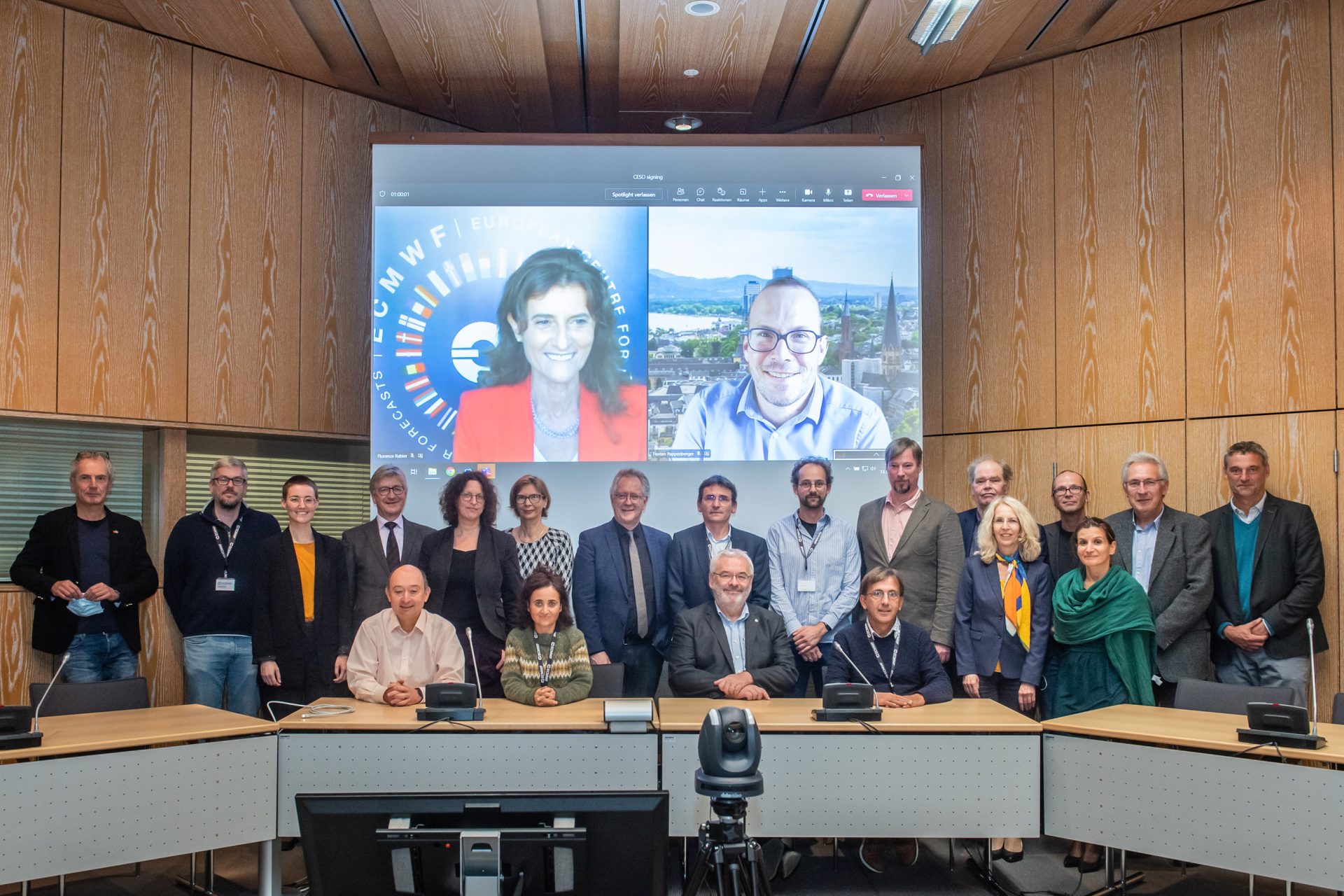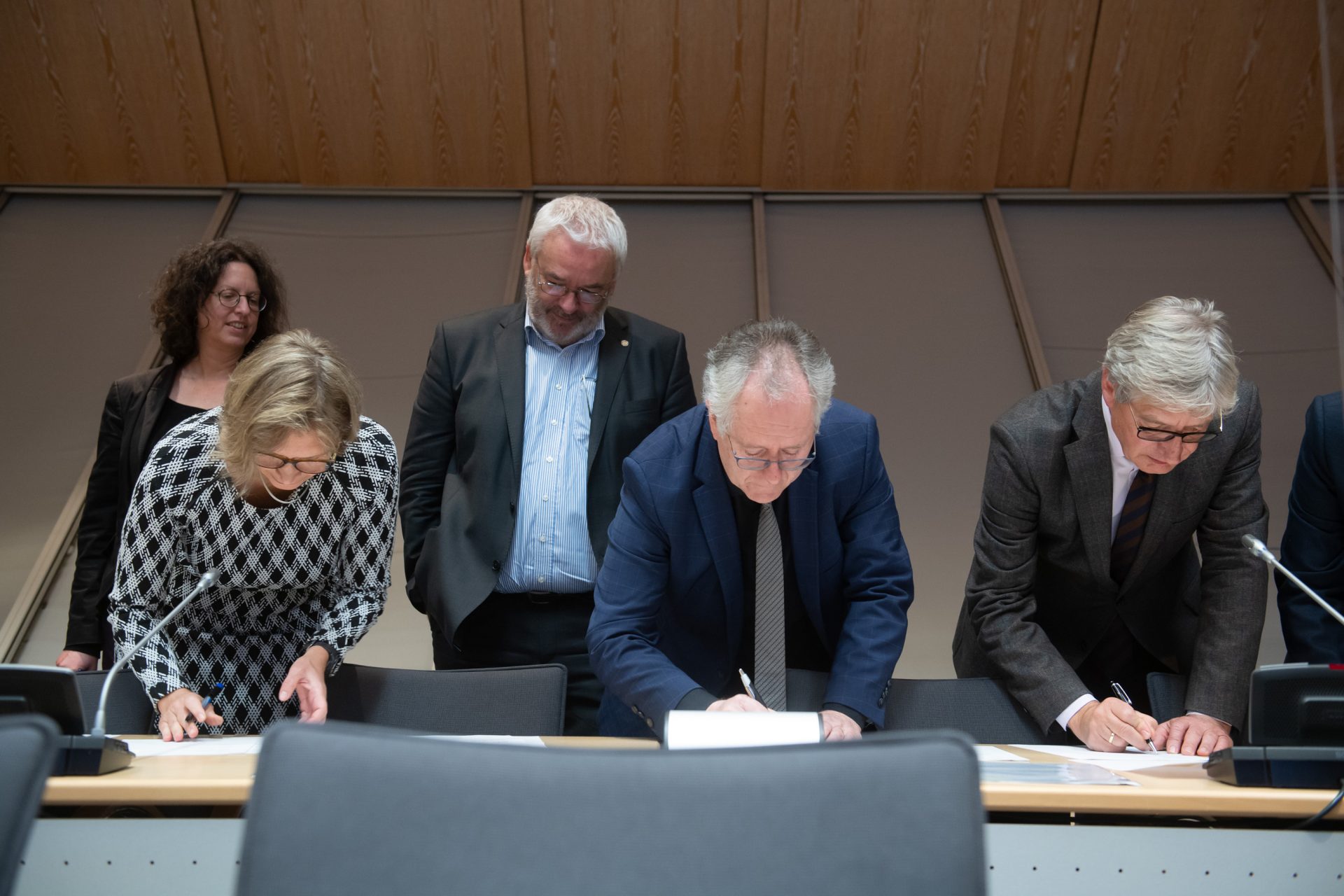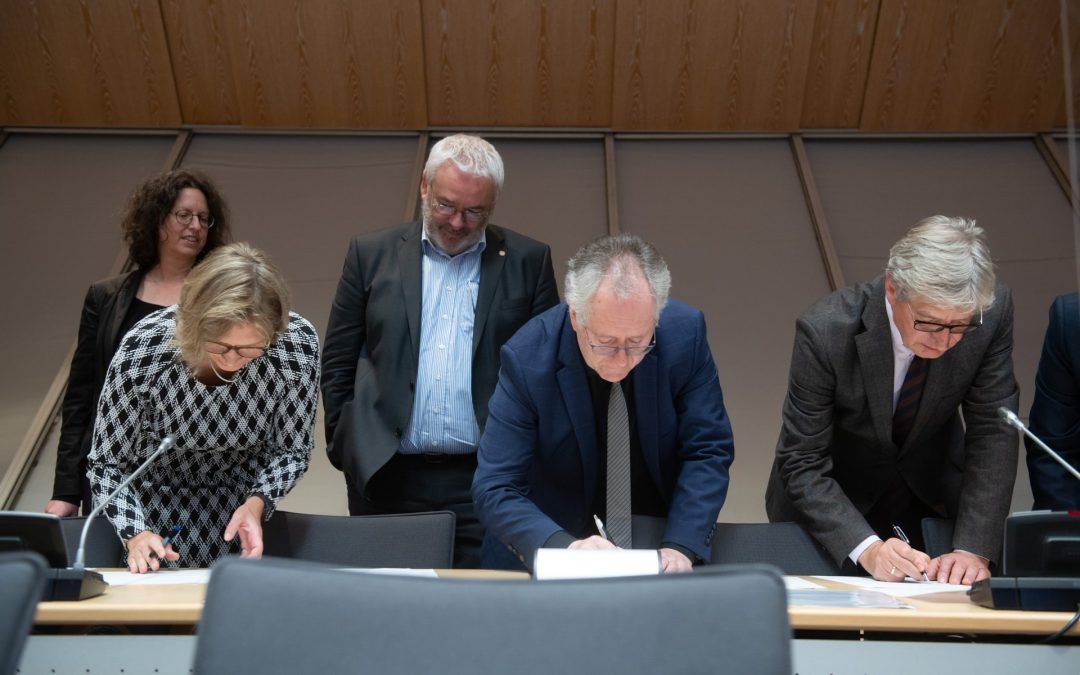Center for Earth System Observation and Computational Analysis and European Center for Medium-Range Weather Forecasts team up
The University of Bonn, the University of Cologne and Forschungszentrum Jülich are placing their joint Center for Earth System Observation and Computational Analysis (CESOC) on a new contractual footing. As a joint scientific facility of the three partner institutions, an internationally visible focal point has been created to globally observe and comprehensively understand the Earth system and to predict changes. The center is additionally strengthened by a memorandum of understanding now signed with the European Centre for Medium-Range Weather Forecasts (ECMWF), which has moved to Bonn in 2021.

Memorandum of Understanding between CESOC and ECMWF – Representatives of all the institutions involved came together for the ceremonial signing of the contract in Bonn.
© Barbara Frommann/ University of Bonn

From left: Prof. Dr. Astrid Kiendler-Scharr (Forschungszentrum Jülich, Board of Directors CESOC), Prof. Dr. Susanne Crewell (University of Cologne, Board of Directors CESOC), Prof. Dr. Dr. h.c.. Axel Freimuth (Rector of the University of Cologne), Prof. Dr. Dr. h. c. Michael Hoch (Rector of the University of Bonn) and Prof. Dr.-Ing. Wolfgang Marquardt (Chair of the Board of Directors of Forschungszentrum Jülich) signing the new CESOC cooperation agreement. © Barbara Frommann/ University of Bonn
In times of global environmental change, it is important to deepen our knowledge of the diverse processes of the Earth’s climate system. A precise description of the interactions between atmosphere, ocean, ice, soil, vegetation and ultimately humans is the prerequisite for better weather and climate models. Observation of the Earth plays a central role in this, because if you do not observe comprehensively, you cannot make accurate predictions.
CESOC brings together important core competencies at the three locations Bonn, Cologne and Jülich. Represented are meteorology, atmospheric chemistry, hydrology, climatology and paleoclimatology, soil sciences and near-surface geophysics, plant and agricultural sciences, geodesy, remote sensing, geoinformatics as well as mathematics, scientific computing and computer science. The two Faculties of Mathematics and Natural Sciences in Cologne and Bonn are involved, as well as the Faculty of Agriculture and the two Transdisciplinary Research Areas TRA1 “Modelling” and TRA6 “Sustainable Futures” at the University of Bonn. At Forschungszentrum Jülich, institutes for energy and climate research, for biosciences and geosciences, and the Jülich Supercomputing Center are part of the new network. The CESOC office was established at the University of Bonn.
The rectors of the two universities, the deans of the participating faculties and the chairman of the board of Forschungszentrum Jülich have signed a new cooperation agreement in Bonn. As founding directors, Prof. Dr. Jürgen Kusche of the University of Bonn, Prof. Dr. Susanne Crewell of the University of Cologne and Prof. Dr. Astrid Kiendler-Scharr of Forschungszentrum Jülich co-signed the agreement.
CESOC cooperates closely with the European Centre for Medium-Range Weather Forecasts (ECMWF), through its Bonn offices. For this purpose, a formal Memorandum of Understanding (MoU) has now also been concluded, which the Rectors, Deans and Directors of the three CESOC institutions have now signed with the ECMWF, represented by the Director of Copernicus Services, Dr. Jean-Noël Thépaut.
ECMWF is an intergovernmental organization whose core mission is to develop new medium-range weather forecasting capabilities and make them available to its Member States and users around the world. It develops and operates global models and data systems for the dynamics, thermodynamics, and composition of the Earth’s fluid envelope and the interacting parts of the Earth system.
CESOC and ECMWF intend to cooperate very closely in the future. To this end, it was agreed to maintain joint projects of cutting-edge research in the future and to pursue common paths in education and training. A continuous transfer of knowledge is to be ensured through a lively exchange of personnel at all qualification levels. The cooperation partners also intend to share their research infrastructures and jointly publish research results.
In a joint statement, the founding board of directors emphasized the importance of the alliance: “We are convinced that the collaboration agreed upon today represents a milestone in the study of the Earth system and its underlying interrelationships. Such highly complex research tasks can only be mastered in the joint effort of excellent partners. With ECMWF, a unique competence center for this research field is being created in the Rhineland.”
ECMWF Director-General Dr. Florence Rabier said, “Our new offices in Bonn were always going to be an opportunity to enhance our collaboration with the national meteorological services of our Member States, and also with their academic institutions. This MoU with CESOC is the best possible illustration of such collaboration we want to foster with those prestigious institutions and their talented scientists. We have very high expectations about what we can do together, and at a time when weather and climate are affecting the world in critical and often tragic ways, we look forward to joining forces with the talent gathered in CESOC.”
Contact:
Prof. Dr. Jürgen Kusche
Institut für Geodäsie und Geoinformation (IGG)
Universität Bonn
Tel. +49 228 73-2629
E-Mail: kusche@uni-bonn.de
Prof. Dr. Susanne Crewell
Institut für Geophysik und Meteorologie (IGM)
Universität zu Köln
Tel. +49 221 470-5286
E-Mail: susanne.crewell@uni-koeln.de
Prof. Dr. Astrid Kiendler-Scharr
Institut für Energie- und Klimaforschung (IEK-8)
Forschungszentrum Jülich
Tel. +49 2461 61-4185
E-Mail: a.kiendler-scharr@fz-juelich.de

